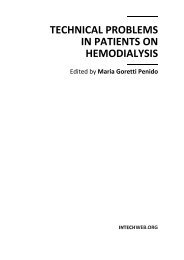new insights into the prevention and treatment of bulimia nervosa
new insights into the prevention and treatment of bulimia nervosa
new insights into the prevention and treatment of bulimia nervosa
Create successful ePaper yourself
Turn your PDF publications into a flip-book with our unique Google optimized e-Paper software.
28<br />
New Insights <strong>into</strong> <strong>the</strong> Prevention <strong>and</strong> Treatment <strong>of</strong> Bulimia Nervosa<br />
working on <strong>the</strong> stage in <strong>the</strong> role <strong>of</strong> a protagonist, its participants experience an incresed<br />
feeling <strong>of</strong> guilt once <strong>the</strong>y realize that <strong>the</strong>y “have taken up o<strong>the</strong>r participants’ time, focusing<br />
o<strong>the</strong>r group members’ attention on <strong>the</strong>ir own problems”. Thus <strong>the</strong>y repeat a pattern <strong>of</strong> a<br />
bulimic cycle: obsessive compulsive eating <strong>and</strong> vomiting followed by a sense <strong>of</strong> guilt [Jay].<br />
However, in <strong>the</strong> early stages <strong>of</strong> group <strong>the</strong>rapy, <strong>the</strong> similar diagnostic background (<strong>the</strong><br />
problems <strong>and</strong> difficulties related to eating disorders) <strong>of</strong> its participants allows to create a<br />
sense <strong>of</strong> group identification <strong>and</strong> build mutual trust among group members. A common<br />
feeling among group <strong>the</strong>rapy members, especially when a group is just starting, is that <strong>of</strong><br />
being isolated, unique, <strong>and</strong> apart from o<strong>the</strong>rs. Enormous relief accompanies <strong>the</strong> recognition<br />
that <strong>the</strong>y are not alone, which is a special benefit <strong>of</strong> group <strong>the</strong>rapy. The phenomenon <strong>of</strong><br />
sharing experiences among group members, which Yalom refers to as “universality”, is a<br />
major <strong>the</strong>rapeutic factor which helps group <strong>the</strong>rapy participants overcome <strong>the</strong>ir sense <strong>of</strong><br />
isolation.<br />
It is a common case that people suffering from <strong>bulimia</strong> <strong>nervosa</strong> spend <strong>the</strong>ir energy on<br />
satisfying o<strong>the</strong>rs. The <strong>the</strong>rapy group, watching <strong>the</strong> protagonist acting out <strong>the</strong> roles he or she<br />
chooses (e.g. <strong>the</strong> role <strong>of</strong> “a loving sister”, “a loyal friend”, or “a diligent student”), provides<br />
supportive witnessing <strong>and</strong> helps <strong>the</strong> individual get in touch with <strong>the</strong> denied, “needy”<br />
aspects <strong>of</strong> him/herself, as well as acknowledge those aspects <strong>of</strong> his or her personality which<br />
<strong>the</strong> person regards as satisfactory. Thus, a patient has a chance to build a more complete<br />
self-image, which is, as it were, contrary to <strong>the</strong> “bad/poor” bulimic self-representation [Jay].<br />
Group members need <strong>the</strong> <strong>the</strong>rapist’s assistance when <strong>the</strong> <strong>the</strong>rapy proceeds from <strong>the</strong><br />
preliminary stage <strong>of</strong> identification <strong>into</strong> <strong>the</strong> phase <strong>of</strong> establishing <strong>the</strong> relationships which are<br />
not related to <strong>the</strong> sphere <strong>of</strong> eating. There are certain structured exercises that <strong>the</strong> <strong>the</strong>rapist<br />
might employ as an effective tool to facilitate <strong>the</strong> aforementioned process. An example<br />
might be an exercise in which <strong>the</strong> <strong>the</strong>rapy participants’ task is to follow <strong>the</strong> <strong>the</strong>rapist’s<br />
instruction: “Put eating aside for a while <strong>and</strong> think about two feelings which you <strong>of</strong>ten<br />
experience. Take on <strong>the</strong> roles <strong>of</strong> <strong>the</strong>se feelings <strong>and</strong> introduce yourselves to your partners.”<br />
This exercise helps to increase group identification [Levens]. Spontaneous behaviour is<br />
regarded by bulimic patients as irresponsible <strong>and</strong> reckless, <strong>and</strong> is usually followed by a<br />
sense <strong>of</strong> guilt. Hence it is necessary for <strong>the</strong> <strong>the</strong>rapist to prepare clients for such spontaneous<br />
reactions by means <strong>of</strong> exercises aimed at increasing <strong>the</strong> participants’ self-esteem <strong>and</strong><br />
building up mutual trust within <strong>the</strong> group [Lacey, Evans, Jay]. The more structured <strong>the</strong><br />
exercises are, <strong>the</strong> more relaxed <strong>the</strong> group becomes. As <strong>the</strong> <strong>the</strong>rapy proceeds, <strong>the</strong> level <strong>of</strong><br />
tolerance increases <strong>and</strong> it makes it possible for <strong>the</strong> <strong>the</strong>rapist to gradually ab<strong>and</strong>on <strong>the</strong><br />
structured exercises. Prior to feeling accepted by o<strong>the</strong>r group members, <strong>the</strong> <strong>the</strong>rapy<br />
participant feels he or she must take on <strong>the</strong> role <strong>of</strong> a protagonist <strong>and</strong> act out <strong>the</strong> particular<br />
bulimic aspects <strong>of</strong> his or her life, very <strong>of</strong>ten using symbols (e.g. a fridge, favourite food<br />
consumed during <strong>the</strong> episode <strong>of</strong> binge eating). Role reversal proves to be an effective<br />
technique aimed at facilitating <strong>the</strong> patient’s underst<strong>and</strong>ing <strong>of</strong> <strong>the</strong> symbolic context, which in<br />
turn allows <strong>the</strong> person to explore his or her problems concerning <strong>the</strong> issue <strong>of</strong> relationships.<br />
A <strong>bulimia</strong> sufferer has a chance to encounter his or her despair, inner emptiness, denied<br />
needs <strong>and</strong> repressed anger. The patient finds it difficult to acknowledge <strong>the</strong> fact that he or<br />
she “is given to” by o<strong>the</strong>rs, which is followed by a sense <strong>of</strong> guilt. “Being given to”, as<br />
opposed to “giving”, is what bulimics feel uncomfortable about. According to Yalom,<br />
altruism is an important healing factor in group <strong>the</strong>rapy [Yalom]. It fosters unconditional<br />
satisfaction <strong>of</strong> needs, which in turn, in case <strong>of</strong> <strong>the</strong>rapy for <strong>bulimia</strong> <strong>nervosa</strong>, facilitates<br />
<strong>the</strong>rapeutic investigation, e.g. it leads to discovering <strong>the</strong> roots <strong>of</strong> guilt which follows <strong>the</strong> act








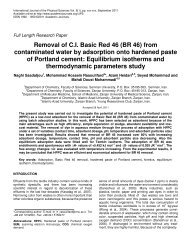

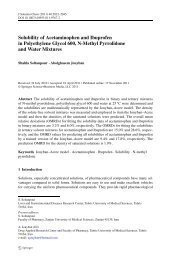
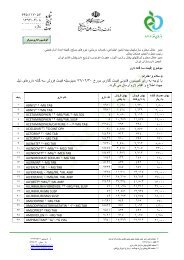

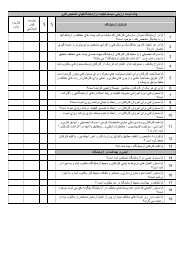
![focuspdca.ppt [Compatibility Mode]](https://img.yumpu.com/22859457/1/190x146/focuspdcappt-compatibility-mode.jpg?quality=85)

